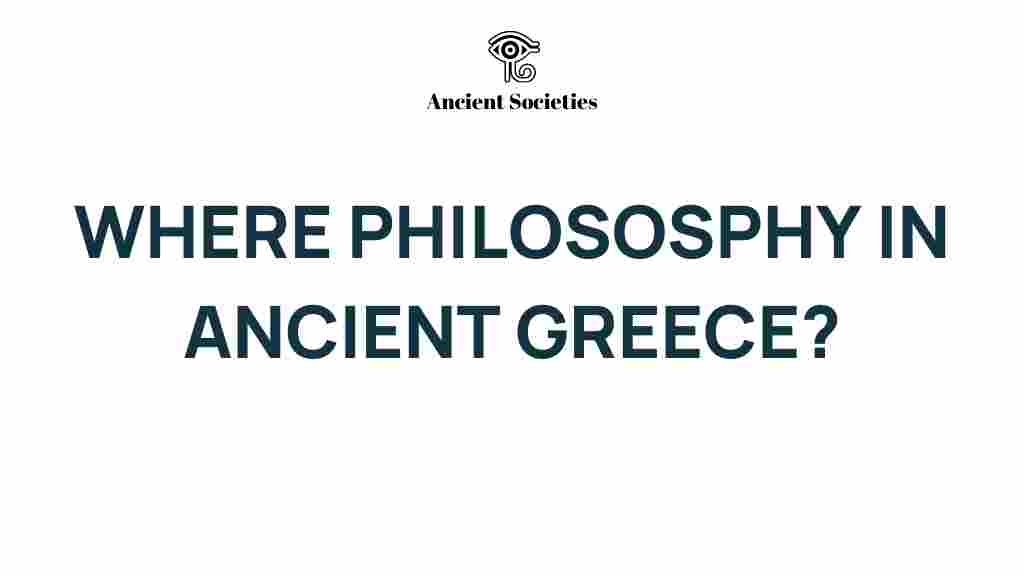Unveiling the Roots of Philosophy: Ancient Greece’s Intellectual Odyssey
Philosophy, with its rich tapestry of ideas and concepts, has profoundly shaped the course of human thought. Ancient Greece stands as the cradle of this intellectual history, where some of the most influential thinkers emerged, laying the foundation for Western thought. This article explores this fascinating journey, focusing on key figures like Socrates, Plato, and Aristotle, whose ideas continue to resonate today.
The Birth of Philosophy in Ancient Greece
The term ‘philosophy’ originates from the Greek word ‘philosophia,’ which translates to ‘love of wisdom.’ The historical context of Ancient Greece provides a fertile ground for the emergence of philosophical thought. It was a time characterized by:
- Political innovation: The rise of city-states and democracy.
- Cultural exchange: Interaction with other civilizations, which enriched Greek thought.
- Intellectual curiosity: A quest for understanding the nature of existence, ethics, and the cosmos.
These factors combined to create an environment where thinkers could challenge established norms and seek deeper truths.
The Socratic Method: A Foundation for Inquiry
One of the most significant contributions to philosophy by Ancient Greece is the Socratic method, developed by Socrates (469–399 BC). This method involves a form of cooperative argumentative dialogue that stimulates critical thinking and illuminates ideas. The key features of the Socratic method include:
- Questioning: Asking probing questions to challenge assumptions.
- Dialogue: Engaging in discussions that reveal contradictions in thought.
- Reflection: Encouraging participants to reflect on their beliefs and values.
This method not only fosters a deeper understanding of philosophical concepts but also promotes intellectual humility, as it highlights the complexities of knowledge.
Plato: The Idealist
Plato (427–347 BC), a student of Socrates, further developed philosophical thought through his dialogues and theories. His contributions to philosophy include:
- The Theory of Forms: Plato proposed that beyond the physical world lies a realm of ideal Forms or Ideas, which represent the true essence of things.
- Political Philosophy: In works like “The Republic,” Plato explored the concept of justice and the ideal state, influencing political thought for centuries.
- Education and Knowledge: Plato emphasized the importance of education in achieving a just society, advocating for a system that nurtures philosophical thinkers.
Plato’s influence extends far beyond his time, as his ideas laid the groundwork for Western philosophy and education.
Aristotle: The Empiricist
Aristotle (384–322 BC), a student of Plato, took a different approach. While Plato emphasized ideals, Aristotle focused on empirical observation and practical knowledge. His contributions include:
- Logic and Reasoning: Aristotle developed formal logic, which remains foundational in philosophy and science.
- Ethics: In his work “Nicomachean Ethics,” he proposed the concept of virtue ethics, emphasizing the importance of character and moral virtue.
- Natural Sciences: Aristotle’s observations and classifications laid the groundwork for many scientific disciplines.
Aristotle’s methodologies and insights have profoundly influenced diverse fields, from philosophy to natural sciences, and his legacy persists in modern thought.
The Cultural Influence of Ancient Greek Philosophy
The thinkers of Ancient Greece did not merely influence philosophy; they left an indelible mark on various aspects of culture and society. Their ideas permeated:
- Art and Literature: Philosophical themes inspired countless works of literature and art, shaping the narratives and aesthetics of Western culture.
- Religion and Myth: The philosophical exploration of ethics and existence often intersected with religious thought, leading to new interpretations of myth and spirituality.
- Political Systems: Concepts of democracy and governance introduced by these thinkers continue to inform modern political structures.
The cultural influence of Ancient Greek philosophy is evident in today’s educational systems, legal frameworks, and ethical discussions, showcasing its lasting relevance.
Challenges and Misinterpretations in Understanding Ancient Philosophy
While Ancient Greek philosophy offers profound insights, it is not without challenges. Scholars and students often face hurdles such as:
- Language Barriers: Translations can obscure original meanings and nuances.
- Contextual Understanding: Failing to grasp the historical and cultural context can lead to misinterpretations.
- Complexity of Ideas: The intricate nature of philosophical concepts can be daunting for newcomers.
To navigate these challenges, consider the following tips:
- Read Original Texts: Whenever possible, consult translations and interpretations of original works to gain authentic insights.
- Engage in Discussions: Join study groups or online forums to discuss and dissect philosophical ideas actively.
- Seek Guidance: Take courses or workshops led by scholars in the field to enhance understanding.
Conclusion: The Enduring Legacy of Ancient Greek Philosophy
The intellectual history of Ancient Greece is a remarkable journey that has shaped the contours of Western thought. From the Socratic method’s emphasis on inquiry to Plato’s idealism and Aristotle’s empirical approach, these thinkers have provided a rich legacy that continues to influence contemporary philosophy, science, and culture.
As we delve into the depths of philosophical inquiry, we must acknowledge the profound contributions of Ancient Greece and their relevance in our quest for knowledge and understanding. Explore further the works of these great thinkers and their impact by visiting philosophy resources online and engage with the ongoing dialogue that defines our intellectual heritage.
In this age of information, let us embrace the lessons of the past, fostering an environment of inquiry that honors the spirit of Ancient Greek philosophy. Together, we can continue the odyssey of thought that began thousands of years ago, shaping our future through wisdom and understanding.
This article is in the category Culture and created by AncientSocieties Team
